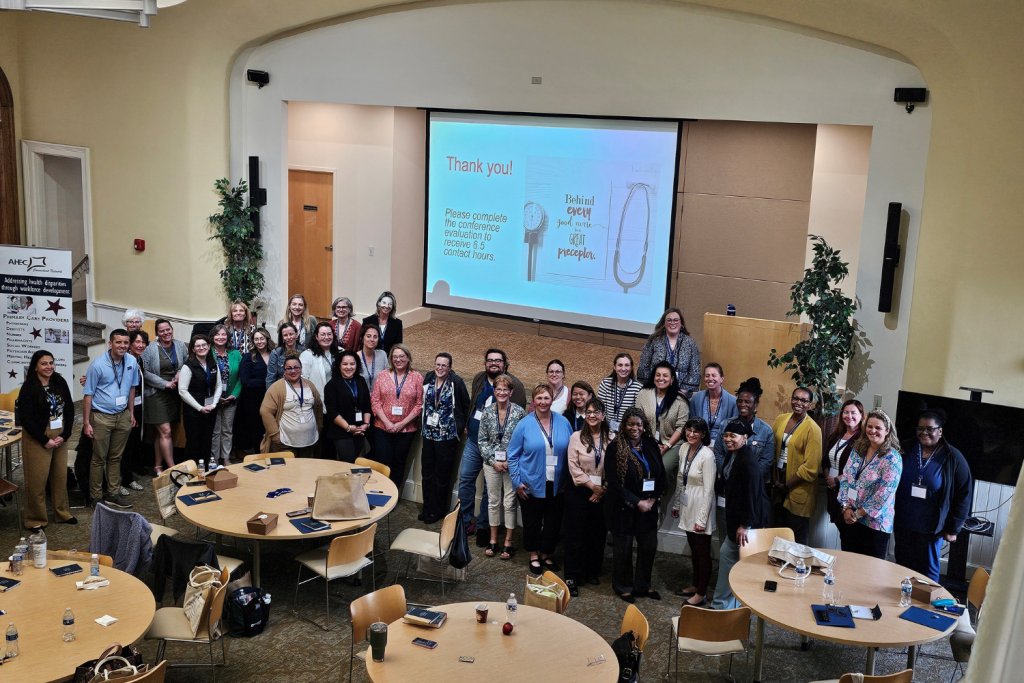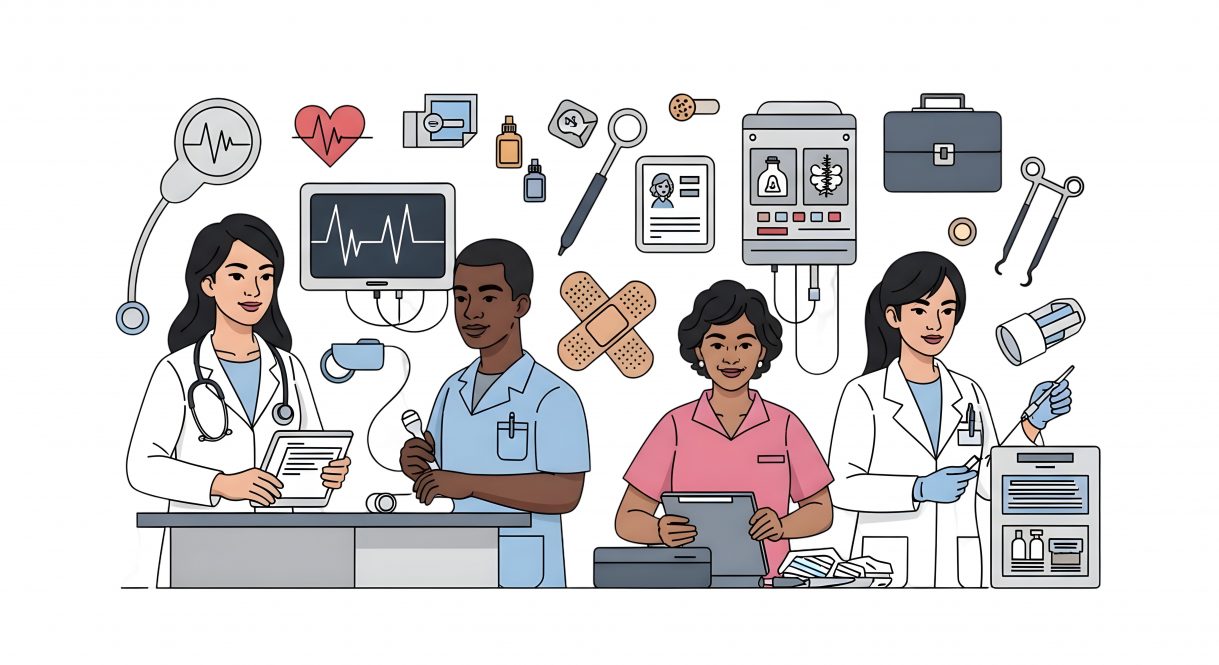What do you do when you are filling out a grant application that requires partners from all six New England states? “Call my AHEC colleagues!” of course is what Linda Cragin, director of the MassAHEC Network at UMass Chan Medical School, did when she and her colleagues from the UMass Chan Tan Chingfen Graduate School of Nursing were drafting a grant application related to nurse precepting and workforce development that required this type of collaboration.
“My first call was to Petra Clark-Dufner, the director of the Connecticut AHEC and she immediately said yes, so I reached out to the other New England AHECs and overnight I had a commitment from all of them,” said Cragin.
There are more than 300 Area Health Education Centers (AHECs) centers in the United States that are part of the National AHEC Organization (NAO). The NAO mission is to enhance access to quality health care, particularly primary and preventive care, by improving the supply and distribution of health care professionals via strategic partnerships with academic programs, communities and professional organizations.
“The aims of this project aligned well with our nursing workforce development work in Connecticut, so we were happy to participate,” says Clark-Dufner. The Program Office for CT AHEC is based at UConn Health in Farmington.
The grant application collaboration between the graduate school and the New England AHECs was a success. The New England Nursing Clinical Faculty and Preceptor Academy, was awarded a $4 million Health Resources & Services Administration (HRSA) grant to increase the nursing workforce by recruiting, training, and supporting skilled qualified clinical nurse faculty and preceptors. Now in its fourth year, the grant has reached over 1,000 nurses and the numbers keep growing. The program targets all levels of nursing, from entry level to advanced practice, who work in schools, public health, nursing homes, community health clinics, primary care, hospitals and other health care institutions.
“Due to the limited grant funding, we implemented a phased-in approach, bringing on two AHEC partners each year. We started in Massachusetts and then included Connecticut and Vermont in year two, New Hampshire and Maine in year three, and now Rhode Island and back to Massachusetts in year four. All AHEC partners have stayed involved, even when their grant support ended,” says Cragin, who serves as project manager on the grant.
“The AHEC partners have been superb,” says Jill Terrien, associate professor at the UMass Chan Tan Chingfen Graduate School of Nursing who serves as the principal investigator on this grant. “They were all very engaged with a lot of good ideas. Their level of commitment has been exceptional. The program has been highly successful, and we have more than met our goals and objectives,” says Terrien.
One of the key components of the training is attendance at the UMass Chan Department of Family Medicine and Community Health’s Teaching of Tomorrow (TOT) master-trainer conference, a nationally recognized interprofessional faculty development program that has trained over 1,900 clinical faculty and preceptors since its inception 30 years ago. TOT focuses on building and refining foundational skills for effective clinical teaching in both the inpatient and ambulatory settings. As part of the grant, each state sends 25 nurses to TOT’s two-day sessions. In addition to funding the conference tuition, the grant covers accommodation, mileage, and a $2,000 stipend for each nurse participant. To date, more than 180 nurses have completed this training, including Jennifer Waldo, MS, RN, a public health nurse with the Connecticut town of Windsor.
“The principles taught in Teaching of Tomorrow have broad applications. Not only may they be used for precepting, but also for a number of broader work responsibilities. TOT provided an opportunity to both learn and practice a number of these skills,” said Waldo, who was in the first group of Connecticut nurses sent to TOT.
“While we had a core activity for all states to support nurse preceptors to attend TOT, we also recognized that each AHEC would implement the grant locally a bit differently. This is the crux of AHEC – each AHEC’s goal is to be responsive to the needs of their local community. Each AHEC had the flexibility to recruit the nurse preceptors to meet their local needs to attend the conference and develop sustainability strategies to continue to meet those needs. Some focused on hospital nurses, others on those in long term care or primary care or public health,” said Cragin.

“In Connecticut, in addition to sending 25 nurses to TOT, we hosted a one-day nurse preceptor training conference in Hartford, and we are in the process of developing a free, online clinical nurse preceptor training program,” says Clark-Dufner of CT AHEC. “The energy and resources gained from this collaboration has helped us take our nurse workforce development to a new level.”
The Maine AHEC also organized a state-wide conference, while the New Hampshire AHEC worked on creating its own webinars and the nurses they sent to TOT went back into their workplaces and have been focused on training others on what they learned. “They are doing just want we want,” says Terrien, “they are training other nurses in their state on how to precept and it is amazing to witness the snowball affect.” Networking and resource sharing across the states has also occurred. “We invited the nursing team from Fairview Hospital in the Berkshires to replicate their nurse preceptor training conference for us in Connecticut. It was great to see nurses teaching other nurses and watching how the Connecticut and Berkshire nurses interacted with one another and shared their preceptor challenges and successes,” said Clark-Dufner of CT AHEC.
A series of free, one-hour nurse preceptor skills webinars are another output from this grant. “We thought we would do maybe four webinars a year, but they have been so popular we now have 40 available online and more in the works,” said Terrien. The webinars are available to everyone, not just the TOT participants, through this grant and continuing education credits are available. The project also supports the “Preceptor Pulse” podcast series on nurse precepting-related topics. Terrien is a co-host on the podcasts.
“As we look ahead to the end of the grant, each state is thinking through its own sustainability strategy – some incorporating the work into their AHEC or into their nursing school partners. So, the grant started with a foundation provided by AHEC partners across the region, and will continue through AHEC partnerships,” says Cragin.
For more information on the webinars, podcast series, and other resources like the teaching toolkit, visit New England Nursing Clinical Faculty and Preceptor Academy.
The New England Nursing Preceptor Academy is funded by the Nurse Education, Practice, Quality and Retention – Clinical Faculty and Preceptor Academies program grant from the Health Resources and Services Administration (HRSA) and is administered by the UMass Chan Medical School/Tan Chingfen Graduate School of Nursing in Worcester, MA in collaboration with partners across New England. HRSA Grant No. T1Q47319. This information should not be construed as the official position or policy of, nor any endorsements be inferred by HRSA, HHS or the US Government.



